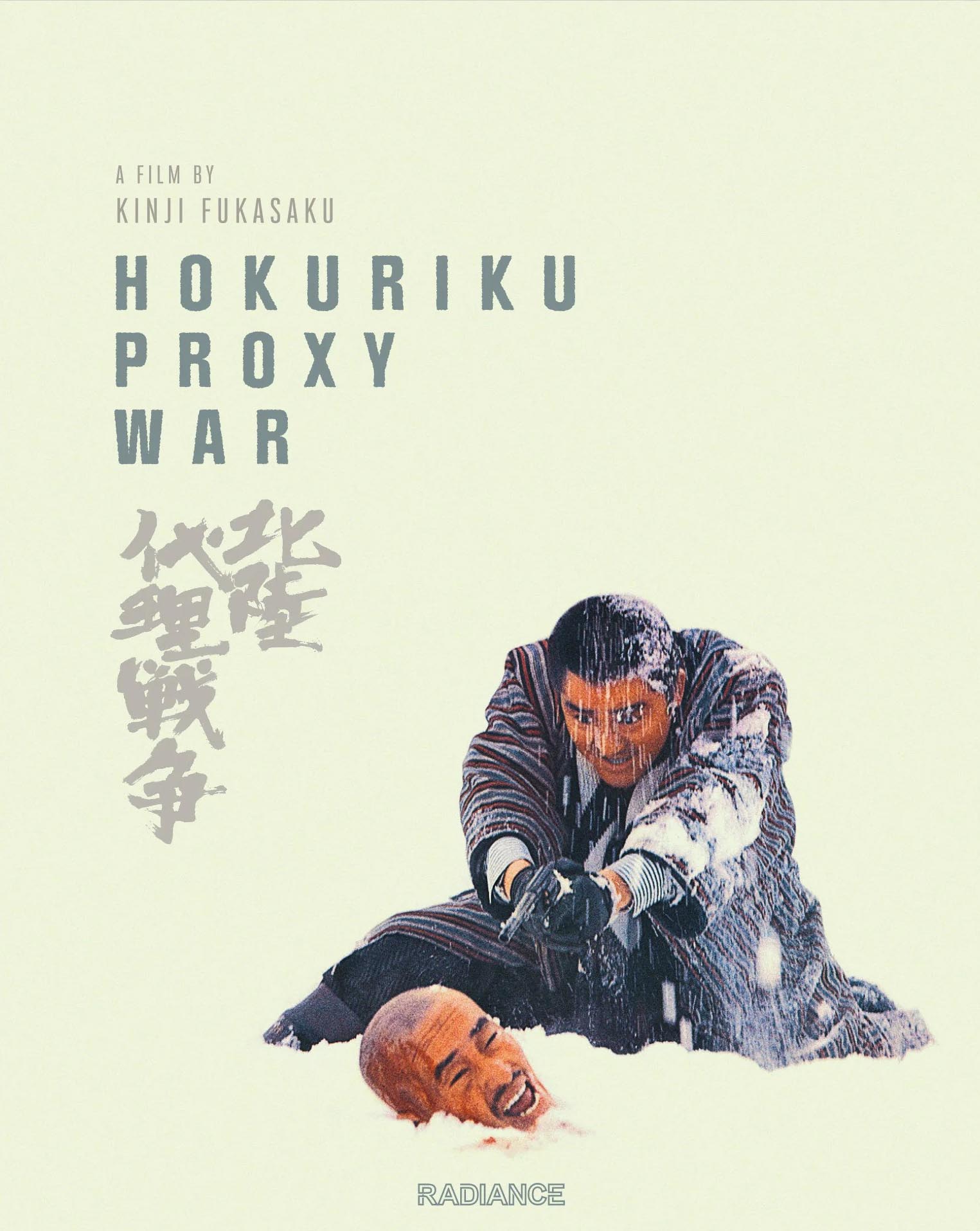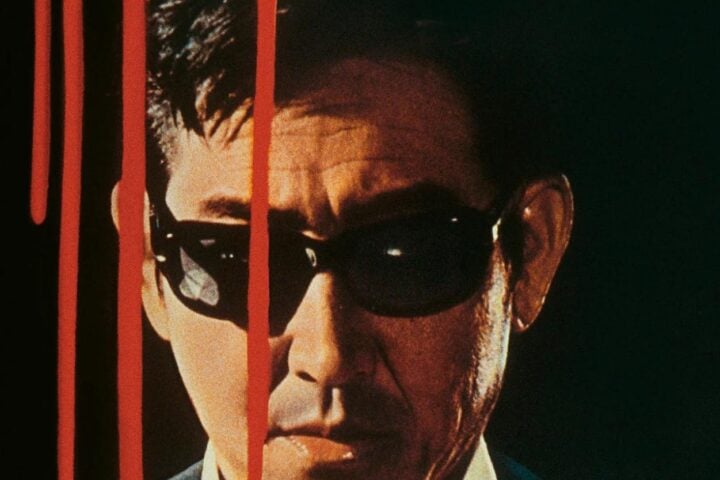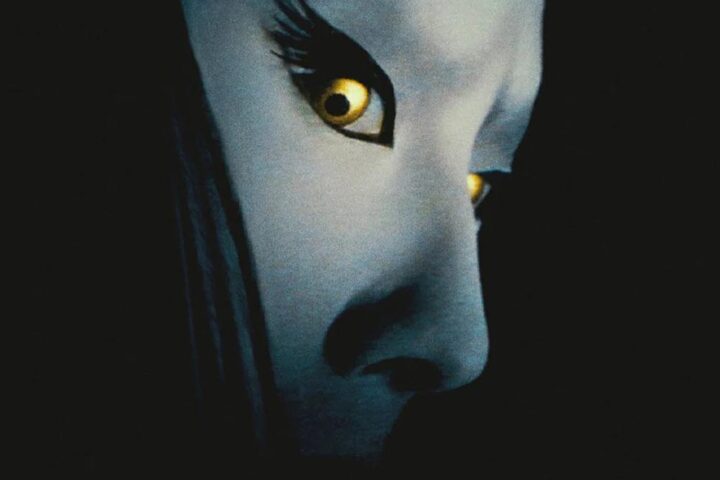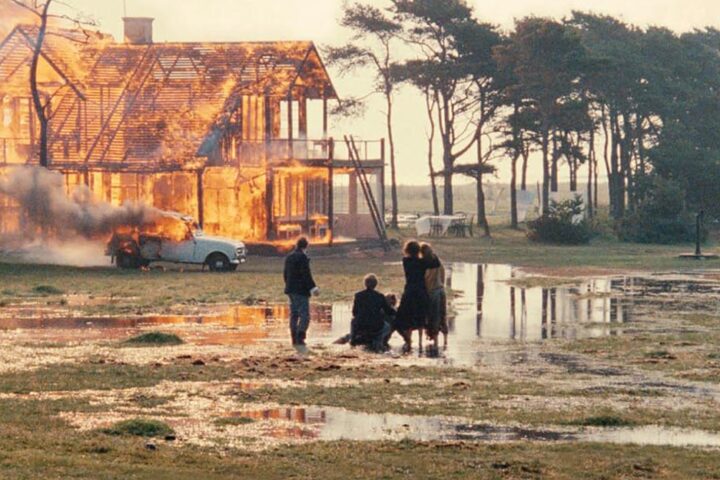 As a narrator explains during the opening of Fukusaku Kinji’s Hokuriku Proxy War, over images of the rough coastal region of Japan’s Hokuriku province, a hard land breeds a similar kind of criminal—so violent that even yakuza from other parts of the country blanch at the brutality that plays out here. Indeed, one swiftly gets the impression that the local gangsters scarcely have time to shake down civilians because they’re too preoccupied with their internecine conflicts. The Hokuriku yakuza operate along a power principle akin to that of Ottoman Empire sultans, of each potential boss rising the ranks by eliminating every possible competitor. That approach leads to a degradation of the talent pool and breeds leaders capable of nothing but wanton, self-destructive violence.
As a narrator explains during the opening of Fukusaku Kinji’s Hokuriku Proxy War, over images of the rough coastal region of Japan’s Hokuriku province, a hard land breeds a similar kind of criminal—so violent that even yakuza from other parts of the country blanch at the brutality that plays out here. Indeed, one swiftly gets the impression that the local gangsters scarcely have time to shake down civilians because they’re too preoccupied with their internecine conflicts. The Hokuriku yakuza operate along a power principle akin to that of Ottoman Empire sultans, of each potential boss rising the ranks by eliminating every possible competitor. That approach leads to a degradation of the talent pool and breeds leaders capable of nothing but wanton, self-destructive violence.
Fukusaku’s 1977 crime film homes in on one such would-be boss, Kawata Noboru (Matsukata Hiroki), who’s embroiled in a war with rival Yasuhara (Nishimura Ko) that rapidly devolves into a threat to the operations of other yakuza. This prompts the boss of the larger Osaka area, Kanai (Sonny Chiba), to try to mediate the spat before it brings down too much police attention on everyone. But Kanai is no less murderously ambitious than his lower-ranking colleagues, and he uses their spat to set in motion his own schemes to increase his power.
The resulting turf war is an occasion for Fukusaku to turn his trademark realism on its head. The film retains his propensity for kinetic camerawork and rapidly edited action, but he puts them to use on a story that renders his recurring interest in the warped honor of gangsters as dark comedy. One early scene, depicting a large hit squad sent by Kanai to kill Kawata at a tranquil retreat, is as gorgeous as it is absurd, with the elegantly choreographed attacks on Kawata in the woods outside the country inn turning the snow-blanketed ground pink.
More than once, unlucky hoods are buried up to their heads in snow and threatened with hypothermia or vehicular flattening in order to get them to squeal. The outlandish exaggeration of these moments is more than matched by the acting, starting with Matsukata’s wry spin on taciturn gangster cool as Kawata. As the man finds himself hunted by more and more rivals, his nihilistic sneer starts to sag from weariness, until he finally ends up sublimating his initial, explosive body language into something more outwardly restrained but no less menacing.
Another aspiring boss, Manitani (Hana Hajime), is a coward forever pulling rubber faces of abject fear at being threatened by others, making him a clown more than a viable competitor even as he rises the ranks. But it’s Chiba who steals the show as Kanai. Dressed outlandishly and delighting in making louche, catlike motions, the martial arts legend’s every move speaks to his character’s obsessive need to wield power. From the moment you first see Kanai, you know that he has no interest in diffusing any tension among his rivals. And while Kawata may be Hokuriku Proxy War’s protagonist, it’s Kanai whose machinations truly spur the free-for-all that draws in an increasing number of yakuza, each attempting to beat and kill his way to the top.
Image/Sound
Radiance’s transfer is sourced from a 4K restoration by Toei Studios that maximizes the contrast between the film’s starkly white winter setting and the explosions of (mostly red) color against that backdrop. Flesh tones are naturalistic and film grain is evenly distributed, and detail is consistently sharp, save the moments where the camera is moving so fast that the image blurs as a result. The mono audio is free of any issues, ably rendering the mix of dialogue and sound effects of blunt weapons colliding with flesh and gunfire crackling with faint echoes.
Extras
This disc comes with new interviews with writer Takada Kôji and actress Takahashi Yoko, who share their memories of working with Fukusaku Kinji. More intriguing is a brief featurette on the film being inspired by real-life criminal cases, as well as how it inspired a few. An accompanying booklet contains three archival essays on the film, two by Kinema Junpo critics Nakamura Muneo and Kano Motohiko and one by filmmaker Fujisawa Isao. Each approaches the film from a different angle, unpacking its political dimensions, relation to Fukusaku’s other work, or his adherence to and deviation from the Toei studio genre blueprints of the time.
Overall
Fukusaku Kinji’s Hokuriku Proxy War, a farcical take on yakuza thriller, gets a solid transfer and a small slate of informative extras from Radiance Films.
Since 2001, we've brought you uncompromising, candid takes on the world of film, music, television, video games, theater, and more. Independently owned and operated publications like Slant have been hit hard in recent years, but we’re committed to keeping our content free and accessible—meaning no paywalls or fees.
If you like what we do, please consider subscribing to our Patreon or making a donation.





